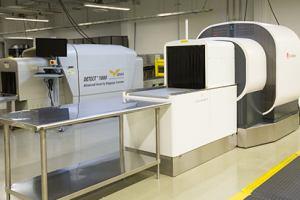
Members of the U.S. House Homeland Security Subcommittee on Transportation and Protective Security were none too pleased with the numbers they saw for the Transportation Security Administration (TSA) in President Donald Trump’s fiscal year (FY) 2019 budget proposal for the federal government.
The Trump budget proposal requests $46 billion in total discretionary appropriations for the U.S. Department of Homeland Security (DHS) and earmarks $7.7 billion in DHS funds for TSA, which ensures the security of the nation’s various transportation systems, including air cargo, mass transit, passenger and freight railways, pipelines, highways and ports.
TSA also daily screens more than 2 million passengers and millions more bags to help protect the United States against emerging threats, according to the president’s budget proposal, which would invest $71 million of the allotted TSA appropriations in new technology to make airport screening faster and more effective.
TSA Administrator David Pekoske, who testified during the April 12 subcommittee hearing examining the president’s FY 2019 budget request, said the TSA’s proposed funding cut of $7.7 billion is a $143.8 million increase over the president’s FY 2018 budget request, and $500 million higher than current funding levels. President Trump’s request also reflects his priorities for keeping the nation’s airports safe, Pekoske told the lawmakers.
But U.S. Rep. John Katko (R-NY), chairman of the subcommittee that has sole jurisdiction over TSA, wasn’t necessarily in agreement.
Rep. Katko said he had concerns about the proposed TSA budget allocation, which he said suggests reduced funds to some TSA programs, while increasing passenger fees from $5.60 to $6.60. The proposed funding for certain aspects of airport security also gave him pause, the congressman said.
For instance, the request for funding to procure 145 Computed Tomography (CT) systems “seems woefully short of what is needed to adequately deploy this advanced technology to airport checkpoints,” Katko said during his opening statements.
Additionally, Katko pointed out that Trump proposes further cuts to the Law Enforcement Officer Reimbursement Program, which provides critical funding to state and local law enforcement charged with ensuring safety and security at America’s airports, including for TSA personnel.
“At a time when public area security remains a top concern, I find this proposal to be insufficient,” Katko said.
Yet Pekoske said the budget request would continue to help TSA protect Americans.
“The president’s budget provides adequate funding to provide for continued security in our transportation system and I would just note that we have been very successful at that for a long time,” Pekoske testified. “The reductions that you see in the budget are a reflection of, ‘Hey, the capacity for this exists somewhere else, maybe the federal government doesn’t need to do this and can direct its [funding] to projects like the CT scanners.’”
In a sense that’s true, agreed U.S. Rep. Bonnie Watson-Coleman (D-NJ), a subcommittee member who said that eliminating certain TSA programs, neglecting to increase TSA salaries for employees, and offering to provide inadequate funding for CT scanners is a way for Trump to redirect federal DHS funds to pay for a border wall.
In fact, the president proposes $1.6 billion in DHS funds for construction of the 65-mile border wall in south Texas; $782 million to hire and support 2,750 additional law enforcement officers and agents at U.S. Customs and Border Protection and U.S. Immigration and Customs Enforcement; and $2.5 billion for detaining up to 47,000 illegal aliens on a daily basis.
“Are you suggesting that the border is more important than these issues that we supported for the purpose of securing people who are flying, riding, or walking?” Watson-Coleman asked Pekoske.
Other committee members wanted to know why the number of CT scanners had been reduced from an estimated 300 needed when Pekoske testified before the committee in January, to 145 in the president’s budget request.
Pekoske said he had limited funds with which to work. Already, he said, 36 CT units are installed in airports, testing facilities and the TSA’s lab. Those being tested are anticipated to be operational over the summer and an additional 145 would be put into place throughout 2019, he said.
But, Pekoske said if he got to the point where he had installed the 145, he might come back to the committee and ask for reprogramming the budget to purchase more.
An estimated 3,000 CT scanners are needed for the nation’s 450 airports, said U.S. Rep. Brian Fitzpatrick (R-PA).
“That’s about $1.3 billion in passenger fees to pay for all of them,” Fitzpatrick said. “But those funds are ear-marked for debt reduction instead.”
Rep. Fitzpatrick also noted that even if the TSA was to get the funding for all the CT scanners they needed, that there was a problem on the supply side getting the machines to the TSA quickly enough that needed to be addressed as well.
“We need these screening devises in all 450 airports across the country,” Fitzpatrick said. “It’s got to be a priority.”